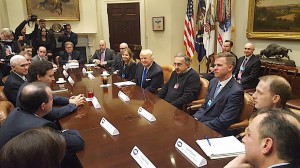
The Big Three automakers would like NAFTA to remain status quo; however, the Trump administration is renegotiating the deal next month.
The proposed border adjustment tax and withdrawing from the North American Free Trade Agreement are unlikely to achieve President Donald Trump’s goals of keeping manufacturing jobs in the U.S. and could actually hurt manufacturing in the process.
Those moves by Trump, if enacted, wouldn’t reverse the trend of moving manufacturing jobs to low-cost countries and could potentially harm the U.S. motor vehicle industry by driving up the cost of new vehicles by hundreds of dollars and leading to the elimination of thousands of jobs in the U.S., a new study found.
The study, commissioned by the Motor & Equipment Manufacturers Association (MEMA) and conducted independently by the Boston Consulting Group examined the real-world implications of a border tax and changes to NAFTA on the motor vehicle sector, which now depends on an integrated supply chain the depends on plants in Canada, the U.S. and Mexico.
“Vitality in the motor vehicle sector hinges on a globally integrated supply chain,” said Xavier Mosquet, a Detroit-based senior partner at BCG and the lead author of the study.
(Trump administration outlines priorities for NAFTA talks. For the story, Click Here.)
“By introducing new tariffs, a border tax and a retreat from NAFTA would greatly impede the industry’s relatively smooth and cost-effective flow of goods across borders in North America and around the world,” he added.
Mosquet also said BCG study found that manufacturers and suppliers would not respond to the BAT or changes to NAFTA by bring jobs back to the U.S. It takes nine years to recover the cost of building a new plant and in business now under pressure to reduce capital expenditures, manufacturers and suppliers indicated they would probably simply continue operating existing factories rather than building new plants in the U.S.
In addition, manufacturers and suppliers have been careful in managing capacity since the recession and the current manufacturing base across North America is operating at 110% capacity and would simply cut operations at the existing manufacturing base as demand shrinks.
As costs go up under the weight of border tax or NAFTA tariff, manufacturers would most like respond by reducing the content on the vehicles they sell, which would put substantial pressure on suppliers who provide the sophisticated safety equipment found on modern vehicles, Mosquet said.
The border adjustment tax is a byproduct of corporate tax reform. In concert with lowering corporate tax rates to 15% to 20%, the BAT would impose at least a 15% tax on imports while exempting the value of a company’s exports from business taxes.
(Click Here for the details about the opening of NAFTA renegotiations.)
Analyzing the implications of a 15% BAT on the motor vehicle industry, the BCG study found that US automakers (OEMs) and suppliers would pay $34 billion in import taxes annually while realizing only $12 billion in export benefits.
The shift could lead to an average $1,000 increase in per-vehicle manufacturing costs at the top 12 OEMs selling cars in the U.S.; a 20% BAT would add an average of $1,800 to per-vehicle production costs.
The precise cost impact for individual OEMs would differ based on the types of vehicles they manufacture, whether their factories are in the U.S. or elsewhere, and the price range and models in their brand portfolio.
Among OEMs assessed by BCG, the automaker with the least advantageous sales mix relative to these criteria would face an average $3,000 per vehicle production cost increase if a 15% BAT were instituted. The OEM in the best position would actually save on average $500 per vehicle in its fleet, chiefly because of brisk tax-advantaged exports of its more expensive vehicles manufactured in the US.
The BCG study also found that U.S. tariffs of 20% to 35% would add $16 billion to $27 billion to automotive costs in the U.S. market. Among the top 12 passenger vehicle manufacturers in the U.S., a 20% tariff on Mexican imports would translate into a $650 average increase in per-vehicle production costs.
Manufacturers most reliant on imports would see its per-vehicle costs rise by an average of $1,100, while the OEM least dependent on imports would face an average $100 markup per vehicle, according to BCG’s analysis. As a result, car buyers could reduce as much as 6% in supplier content—and 25,000 to 50,000 positions in US supplier factories.
Changes in NAFTA rules would weaken the ability of U.S. motor vehicle companies to compete globally, says BCG. About half of all imported parts that U.S. OEMs procure for vehicle production come from low-cost countries and nearly 50% of these components are from Mexico.
(No change to NAFTA rule of origin Mexico officials say. Click Here for the story.)
An increase in NAFTA’s tariffs or rules of origin could drive up costs per vehicle substantially. And it would place the U.S. motor vehicle companies at a disadvantage against, for instance, German automakers, which import about the same percentage of components from low-cost countries as their U.S. counterparts do now.
